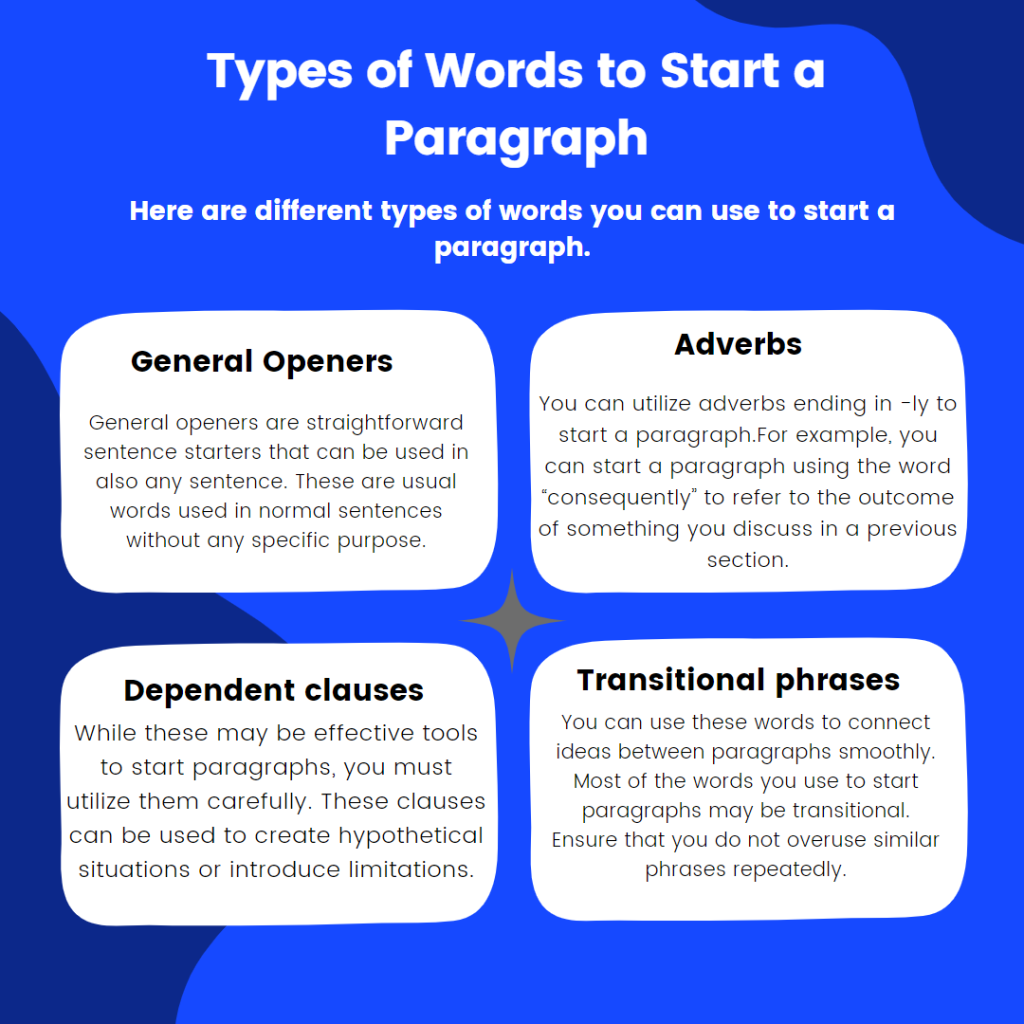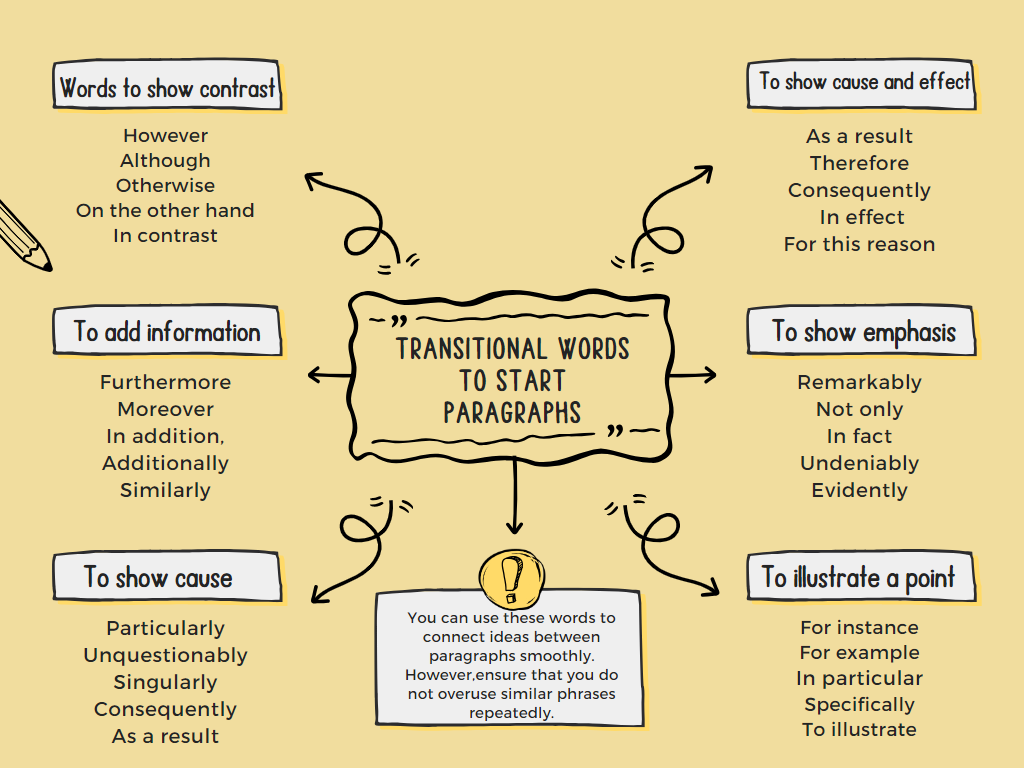Words to Start a Paragraph
So you have been assigned a 1000-word essay or term paper by your instructor. You have a topic in mind that you want to cover. You have also put together some ideas to help you structure your term paper. Now, you have to get down to the actual work and start writing, but you’re stuck; how do you start the body paragraphs of your essay? What sentence starters can you use in your writing? Worry not, we are here to help you make this process a lot easier.
Successfully writing an essay requires you to consider the structure and purpose of every paragraph within the overall work. Words can ignite emotions, paint vivid pictures, and shape our understanding of the content of a document. Choosing the right words to start a paragraph grabs the reader’s attention by establishing the flow of ideas to come. Yet, many of us often ignore the words we choose for our writing, especially those used to start paragraphs. While these words may seem insignificant at first, we soon understand that choosing the right paragraph starter words may make or break the flow of your writing. For a student, applying the correct words is especially important as it may ultimately play a part in your grading. Paragraph starter words can guide your writing journey to ensure a logical flow and high-quality essays.
This article explores the different words you can use to start paragraphs. The paper begins with a brief description of paragraph starters, followed by a guide of words you can use in your writing.
Defining a Paragraph
The body paragraphs of an essay are an essential part of your overall paper. They help keep your readers captivated while they follow your argument. All body paragraphs in your essay should begin with a topic sentence, followed by supporting evidence, and a concluding sentence that connects your ideas to the next paragraph (Cahill, 2013). The first sentence of the paragraph is an essential tool you can use to create clarity. Every paragraph should explore a single idea to ensure logical flow and an easy selection of transitional words between paragraphs. For this reason, it is crucial to ensure that you start your paragraph strongly to ensure that the audience knows what to expect.
Understanding Paragraph Starters
Starting body paragraphs differs from writing the introductory section of an essay. This is because body paragraphs are the main parts of your essay, and you need to cover the topic in detail. Therefore, the way you start a paragraph will help you introduce supporting details with flow and ease. A paragraph starter denotes the opening words or sentences of a paragraph (Cahill, 2013). It sets the stage for a logical flow of ideas in that particular section of your writing. Therefore, they let the reader know what the paragraph will be about and connect them to previous ideas. The right words will offer a smooth transition from the preceding paragraphs, making the work engaging for the reader. Therefore, paragraph starters are crucial in bringing the entire work together by connecting every point within the essay.
Table 1 below summarizes the importance of paragraph starters.
| Significance of Paragraph Starters |
| · Act as bridges between paragraphs, allowing a logical flow of ideas
· They can be used to introduce the central theme of the paragraph · Paragraph openers grab the attention of the reader. · They also help differentiate your writing from unofficial spoken language |
Also read through our comprehensive guide on how to format an academic essay
Types of Words to Start a Paragraph

Types of words to start a paragraph
There are different types of words you can use to start a paragraph.
- General Openers: General openers are straightforward sentence starters that can be used in also any sentence. These are usual words used in normal sentences without any specific purpose.
- Adverbs: You can utilize adverbs ending in -ly to start a paragraph. These adverbs are recommended to emphasize a particular aspect of the paragraph’s main point. For example, you can start a paragraph using the word “consequently” to refer to the outcome of something you discuss in the previous section.
- Dependent clauses: While these may be effective tools to start paragraphs, you must utilize them carefully. These clauses can be used to create hypothetical situations or introduce limitations. It is also important to note that these types of clauses cannot stand along as complete sentence. For example, “While the solution might seem complex, the benefits of using social media for political purposes outweigh the challenges.”
- Transitional phrases: You can use these words to connect ideas between paragraphs smoothly. Most of the words you use to start paragraphs may be transitional. Ensure that you do not overuse similar phrases repeatedly. You can mix and match words with synonyms to keep your work engaging.
There are different types of transitional phrases, as seen in Table 2 below.
| Transitional Words to Start Paragraphs | Examples |
| Words to show contrast | · However
· Although · Otherwise · On the other hand |
| Words to add information | · Furthermore
· Moreover · In addition, · Additionally, · Similarly |
| Words to show cause | · Particularly
· Unquestionably · Singularly · Consequently · As a result |
| Words to show emphasis | · Remarkably
· Not only · In fact · Undeniably |
| Words to illustrate a point | · For instance
· For example · Notably · In particular · Specifically · To illustrate |
| Words to show accepted concepts | · Historically
· Initially · It is commonly believed that |
| Words to show cause and effect | · As a result
· Therefore · Consequently |
| Words to summarize your essay | · In conclusion
· In summary · Finally |
Table 2: Transitional words to start paragraphs

Transitional words to start a paragraph
Quick Tips for Choosing the Right Words to Start Paragraphs
- Understand the purpose of the paragraph and choose a word that reflects your objective. For example, if the main aim of the paragraph is to show evidence, you can start with the words “From existing literature…”
- Consider the flow: Your paragraph should connect smoothly to the one before. Transitional words (such as although, however, consequently, as a result, therefore, etc.) will help you establish the relationship between your ideas.
- As mentioned above, do not start every paragraph with similar words. Ensure you mix paragraph openers to keep your work engaging and to avoid repetitiveness.
- Use a comma after every transition word at the start of a sentence.
Conclusion
The word that starts a paragraph holds immense power to the reader as it helps them anticipate its contents. The sentence starters you select act as a bridge that smoothly connects ideas throughout your writing. Therefore, thoughtfully selecting your paragraph openers ensures you can produce quality documents. This article has provided you with examples of words that you can use to start paragraphs and their purpose. Remember that the words you choose to begin every paragraph with set the tone and determine the flow of your writing. It is also best to select an opener that maintains the flow and purpose of your writing.
Are you stuck on where to start with writing your academic essay? Reach out to us for expert help. We also provide nursing assignment help at a fair cost.
Reference
Cahill, N.S. (2013). Skills for effective writing. New York: Cambridge University Press.
